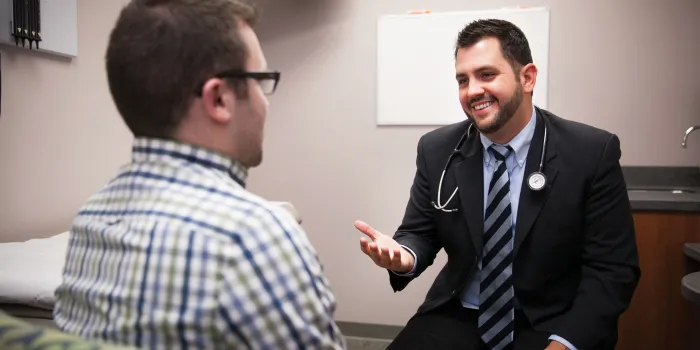For as long as he can remember, Jonathan Roberts, MD, knew he wanted to be a hematologist. Roberts was diagnosed with severe hemophilia A as an infant. His hematologist, Michael Tarantino, MD, became his mentor during Roberts’ high school and college years in Peoria, Illinois, providing opportunities for him to work in the coagulation laboratory and nurturing his passion for hematology.
“From my earliest memories, when people asked me what I wanted to do, this was it,” says Roberts. “Dr. Tarantino helped foster my interest and showed me the path.”
Today, Roberts and Tarantino work together at the Bleeding & Clotting Disorders Institute in Peoria, where Roberts is associate medical director and research director. He’s also assistant professor of pediatrics at the University of Illinois College of Medicine at Peoria. Roberts spends his time seeing patients, working on clinical and translational research trials, teaching residents and mentoring new doctors. And although Tarantino was Roberts’ first mentor, he was not his last.
Roberts participated in the NHF-Shire Clinical Fellowship Program, which was designed to generate excitement about the field of hematology. Established by the National Hemophilia Foundation (NHF) in 2003, the program to date has supported more than 30 physicians, who receive up to $100,000 per year for a maximum of two years. Baxter Healthcare Corporation, then Baxalta US, and now Shire PLC have supported this clinical fellowship training program for the past 14 years.
For Roberts, that fellowship meant doing research on assay development for von Willebrand disease at the Medical College of Wisconsin and the Blood Center of Wisconsin, in Milwaukee, where he worked under the guidance of Joan Gill, MD, and Robert Montgomery, MD.
“We have to bring up the next generation,” Roberts says. “Right out of my fellowship, I started mentoring my first student.”
Hematology Mentoring is essential
Lindsey George, MD, now an attending physician in the Division of Hematology at the Children’s Hospital of Philadelphia, is also an instructor in the Department of Pediatrics at the Perelman School of Medicine at the University of Pennsylvania. Her NHF-Shire Clinical Fellowship was completed under Leslie Raffini, MD, director of the Hemostasis and Thrombosis Center at the Children’s Hospital of Philadelphia. Raffini herself was once a clinical fellow in the program.
“She’s a really gifted mentor,” George says of Raffini. “She’s able to teach you in a way that you feel like you’re her colleague.”
Most new physicians choose their specialty because of mentors, says George, adding that it’s hard to get a good sense of a specialty without that relationship. “It’s hard to connect the dots without that person to help you understand all that goes into it and what opportunities there are in the future.”
Mindy Simpson, MD, is a pediatric hematologist who did her NHF-Shire Clinical Fellowship at the University of Colorado Anschutz Medical Campus. Today, Simpson is an assistant professor in the Department of Pediatrics at Rush University Medical Center in Chicago and medical director of the Hemophilia and Thrombophilia Center at Rush. She cites her NHF-Shire Clinical Fellowship award as essential to allowing her to pursue her passion for benign hematology.
Simpson says funding is a challenge for benign hematology, “so the fact that I got an NHF-Shire grant meant that really from the day I started, I could pursue what I wanted.”
Important hematological work ahead
Roberts is energized by the potential to find a cure for hemophilia A and B through gene therapies and by the choices in therapeutics now available to patients. “It’s an exciting time, and we’re making breakthroughs,” he says, so it’s critical that the next generation of doctors is ready to push the science forward.
The NHF-Shire Clinical Fellowship ensures that each year, a new class of hematologists joins the ranks of intrepid physicians working toward finding effective treatments for bleeding disorders and, hopefully one day, a cure.

